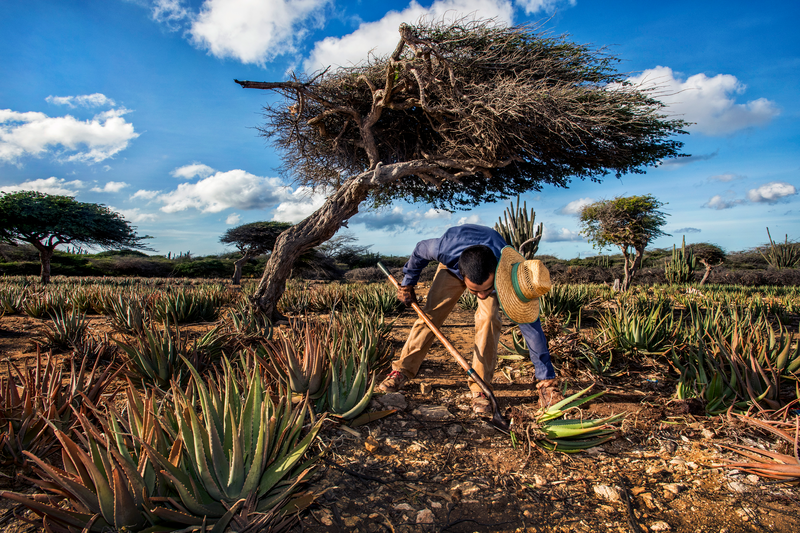
Cultural Sustainability Atlas 2024 - Aruba
1/ Challenges for the Aruban lntangible Cultural Heritage Elements & Local Traditions
The island's rich cultural heritage encompasses traditions like the "Dera Gai" harvest celebration, where locals gather to thank the land for its bounty, and "Bon Bini Festival," a vibrant event showcasing music, dance, and local cuisine.

Crafts like "Aruban aloe vera products" confront hurdles in continuity. Efforts to safeguard these traditions, knowledge and unique skills involve community-led initiatives, educational programs, and heritage documentation projects aimed at preserving and transmitting cultural knowledge across generations
.
2/ Aruban Identity in the Context of Globalization
Globalization presents complex challenges to Aruba's cultural identity. The influx of foreign media, tourism, and modern lifestyles poses a risk to traditional crafts like "Aruban lace-making".
Aruban lace-making holds a significant place in the island's cultural heritage. Traditionally crafted by local artisans, Aruban lacework features intricate designs and delicate patterns, reflecting the island's history and creativity. However, this traditional craft faces threats due to changing lifestyles and reduced interest among younger generations. The decline in lace-making artisans and the availability of cheaper imported goods challenge the continuity of this art form. Efforts by organizations like the Aruba Lace-Makers Foundation aim to preserve and promote this heritage craft through workshops, exhibitions, and educational initiatives, emphasizing the importance of sustaining local craftsmanship amidst modern challenges.
Balancing the integration of external influences with safeguarding indigenous customs becomes pivotal in preserving the unique cultural identity of Aruba.
3/ Aruban Local Cultures & Climate Change
Aruba's local cultures intersect with environmental challenges concerning the nature-culture relationship. Traditional practices like "Aruban agriculture" and "aloe cultivation" face environmental pressures such as water scarcity and climate change. The community's reliance on sustainable agricultural practices, guided by ancestral knowledge, showcases their commitment to preserving ecological balance amidst changing environmental dynamics.
Aloe cultivation indeed forms a crucial part of Aruba's cultural and economic landscape. The island has a long history of aloe vera production, known for its therapeutic properties and high-quality skincare products. However, aloe cultivation faces challenges due to climate change impacts, such as increased temperatures, erratic rainfall patterns, and prolonged droughts. These environmental changes affect aloe plant growth and productivity, impacting the local economy and the island's renowned aloe-based industries. Innovative methods like water-saving irrigation techniques and aloe vera genetic research are being explored to adapt to these changing climatic conditions, emphasizing the need for sustainable aloe cultivation practices to mitigate the effects of climate change.

4/ Local Cultures & Tourism in Aruba
The interplay of local cultures and tourism in Aruba offers both opportunities and challenges. Celebrations like "Carnival" or "Aruba Soul Beach Music Festival" attract tourists seeking cultural experiences. Balancing tourism development with preserving authenticity remains a challenge. Initiatives promoting local crafts, cultural heritage tours, and eco-friendly tourism ventures aim to maintain cultural integrity while fostering sustainable tourism practices.

5/ What Aruban Local Culture(s) can Bring to Sustainable Development
Aruba's local culture can contribute valuable lessons to global sustainability narratives. The island's emphasis on community-centric values, such as the "Dera Gai" harvest celebration, reflects a deep respect for nature and the land. The practice of thanking the land for its bounty encourages a sense of stewardship and sustainability.
Additionally, the integration of local crafts like lace-making or aloe vera products into sustainable economic models showcases the importance of preserving cultural heritage while fostering economic growth. Aruba's focus on sustainable tourism initiatives, eco-friendly practices, and community-driven conservation efforts provides a model for a balanced approach to development that prioritizes cultural preservation, environmental sustainability, and community well-being, which can offer insights and inspiration on a global scale.

6/ State of the Arts in Aruba
Aruba's state of the arts reflects resilience and creativity amidst challenges. Artists like Elisa Lejuez, known for her vibrant paintings depicting local landscapes and cultural scenes, exemplify the island's artistic vibrancy. However, limited resources and infrastructure hinder the full potential of the artistic community. Investments in arts education and cultural institutions are vital for nurturing local talent and preserving cultural heritage.
7/ How the Aruban Corporate Sector is Engaging for Culture
Corporate and private sector engagement in Aruba's culture involves collaborations supporting cultural events and heritage preservation. Entities like Aruba Aloe, Divi Resorts, and Tropicana Aruba Resort & Casino contribute to events like the Aruba Hi-Winds Festival or support cultural institutions such as the National Archaeological Museum. Their contributions not only provide financial support but also demonstrate corporate commitment to preserving Aruba's cultural heritage while promoting tourism and community engagement.